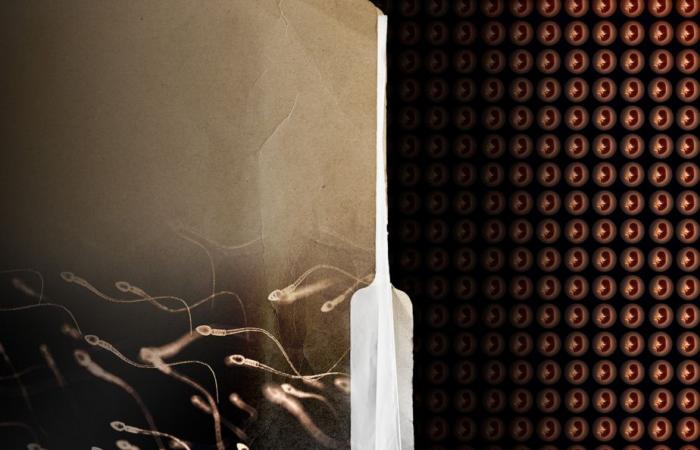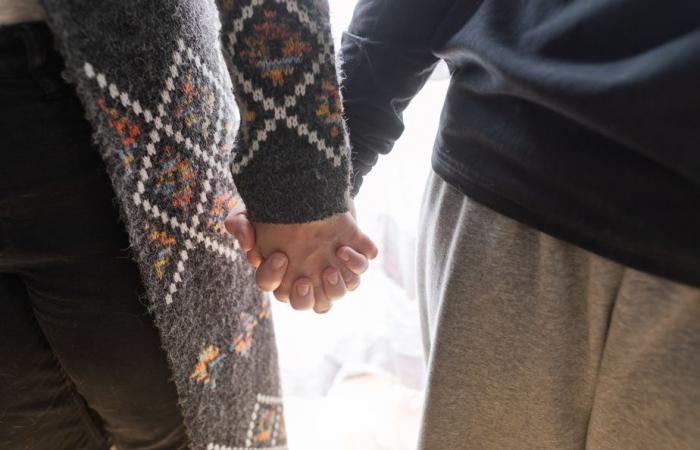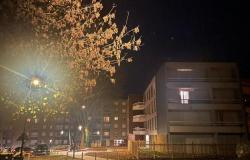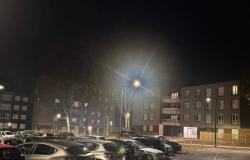Single in her thirties, Julie* especially did not want to “wake up at 40 without children”.
Posted at 5:00 a.m.
She turned to the Procréa fertility clinic in Quebec, where she was provided with a “straw” of sperm from an anonymous donor, who could “only give five times, whether there was a pregnancy or not,” a professional at the clinic would have assured him.
“I was completely confident,” she says.
It was 2016. Her son was born on her second insemination attempt. So she used two straws from the donor.
Do the math. That left only three chances that my son would have a half-brother or half-sister somewhere.
Julie
If Julie speaks in the past tense, it is because she now feels cheated by Procréa (merged with the Ovo clinic in 2021).
Julie discovered, on the sidelines of a journalistic investigation carried out by Marie-Christine Bergeron and Maxime Landry**, that the father of her son is one of three serial donors who are said to have fathered nearly 700 children in Quebec, the majority through artisanal donations.
These journalists uncovered the practice of the donor baptized X and his two sons, donors Y and Z, as well as the identity of mother).
Donor Z (or D-073, according to his donor number at Procréa) is called Raphaël Normand, was able to confirm The Press.
A woman who considers herself a victim of these serial donors, Laurie***, has just filed a lawsuit to force the three men to stop their donations.
“The government is washing its hands of it,” laments the mother of four children resulting from artisanal sperm donations. It is the mothers who carry the problem on their shoulders. »
PHOTO OLIVIER JEAN, THE PRESS
Laurie had four children from two artisanal donors.
Not a month goes by without Laurie being contacted on social networks by a panicked mother who discovers that her child, the result of a donation from Philippe Normand or one of his sons, is linked to nearly 700 others children born in the province.
A “horror film”
The Press has collected the testimonies of five families who find themselves unwillingly involved in this “horror film” – the expression is from one of them – even though they have done everything “by the rules”.
They all received a donation from Raphaël, whose father, Philippe Normand, carries the gene for a rare hereditary disease, tyrosinemia, which can cause kidney and liver problems.
In addition, at least one child donated to the Raphaël fertility clinic has a serious genetic condition – DiGeorge syndrome – even though the mother is not a carrier of the gene.
The Press found and confronted Raphaël, who claimed that his last donations in the clinic were around ten years ago. He confirms having also made craft donations to six families, which would have led to two births.
Today, parents who received a donation from Raphaël in the clinic feel abandoned by the State and by the health establishment in which they trusted.
In the email exchanges that The Press was able to consult, the Ovo clinic simply provides a donor number to the families concerned (i.e. D-073), telling them to consult their family doctor if they have concerns about possible genetic problems in their offspring.
“I went to the clinic because I was assured that the genetic tests had been done; that there is little risk of inbreeding, says Julie. I did everything I could to prevent that from happening. »
Go to the clinic, says Dubé
After the documentary was broadcast in the fall of 2023, the Minister of Health, Christian Dubé, insisted on the fact that women should consult a fertility clinic rather than resorting to homemade donations.
His ministry recalled that the Medically Assisted Reproduction Program offered a program “marked and based on the best standards of practice”.
Valérie, whose 11-year-old daughter is the result of Raphaël’s donation to the Procréa clinic in Montreal, does not take offense. There, he would have been verbally assured that a donor could provide his sperm to “ten families” at most, spread across Quebec.
Today, she knocks on every door to receive help. In vain.
Valérie has neither a family doctor nor the means to turn to the private sector to find out if her daughter carries a genetic disease.
She wrote to the Ministry of Health and Social Services (MSSS), which responded with a generic email addressed to women who had dealt with an artisanal donor, whereas she had received a donation in a clinic from fertility.
I got a copy and paste. It is clear that at the Ministry, they did not read my email.
Valerie
The MSSS says it is “sensitive to the situation experienced by these families”. “We understand that they may feel frustrated and disappointed,” said its spokesperson, Francis Martel, by email. Note that the response sent by the MSSS aimed to provide relevant information to all women affected by the targeted donors, and this, initially only. » The MSSS has an action plan for the future, he assures.
Valérie regrets not having asked the clinic for written proof of the maximum number of donations per donor.
In the same boat
“I went to the clinic to avoid having problems and I found myself with the same problems as the others,” says Jacinthe, who was followed at Procréa, with her partner.
The Ovo clinic did not see fit to alert Jacinthe – nor any other family to whom The Press spoke as part of this report – that his donor is part of the father-son trio, at least one of whom carries a genetic disease.
Nor that a child from the same donor had DiGeorge syndrome, while other families who had also done business with Procréa were warned.
This is a rare genetic condition. Most often, there are heart and palate malformations (cleft palate), as well as facial abnormalities (dysmorphia). An overall developmental delay which can go, in certain cases, to intellectual disability, and a deficiency of the immune system are also sometimes noted, according to information sent by the Ovo clinic to a worried mother.
Jacinthe demanded accountability from Ovo. We responded by email that we were “sorry” for not having contacted her sooner, emphasizing that it is “very difficult to trace each of the patients who used it [en parlant de D-073] at Procrea [avant la fusion] ».
The clinic also specifies that the donor “is not reachable and could not be contacted to be tested himself and to eliminate the condition on his side”.
To another concerned mother, the company clarified that there were “unfortunately no more samples from this donor”; “everything has been exhausted.”
I find that we are the most wronged, the biggest victims because we followed the law and then we find ourselves in the same mess.
Hyacinth
“I paid precisely not to have a Starbucks that gives everywhere, to anyone, without thinking about existing families! », exclaims Coralie, a mother of three children from D-073.
The five families interviewed in this report express the same wish: the clinic must “take its responsibilities” and warn all families who have received a donation of D-073 and the link with this family of ultra-donors.
No more traces
“We cannot confirm or deny whether or not your donor is mentioned in the public health case. »
This is the response that Sandrine and her partner received from the Ovo clinic after the documentary was broadcast.
The couple was referred by the Laval University Hospital Center (CHUL) to Procréa Québec (now Ovo) in 2017. “We felt confident in a private clinic referred by the hospital,” says Sandrine, bitter.
At the clinic, the couple said they specifically requested that the donor not be from Quebec by opting for a Canadian bank.
She was also told that a donor was used “less than 20 times”, relates Sandrine. But the couple’s donor turned out to be… Quebecer D-073. “There would need to be real standards for a maximum number of children per donor and for us to really know where it comes from,” says the mother of two children.
In a report from The Press in 2018, the Ovo clinic specified that it limited the number of families that a donor can create to 10. At Procrea, at the same period, the clinic said it followed the guidelines of the American Society of Reproductive Medicine, i.e. 25 children per donor per 800,000 population.
Ovo’s communications director, Chloé Plenet, indicated that she did not wish to “comment or participate in an interview” on the subject of this report.
Sandrine and her partner dread the day when they will have to explain everything to their offspring: “When our children fall in love, we will have to make sure that the other person is not a half-brother, an uncle or a cousin. »
* Mothers who confided in The Press requested anonymity to protect their child’s identity.
** The two journalists are now respectively news anchor and senior news manager at Noovo. Their documentary series is available on Crave.
*** A court order prohibits us from identifying him.







